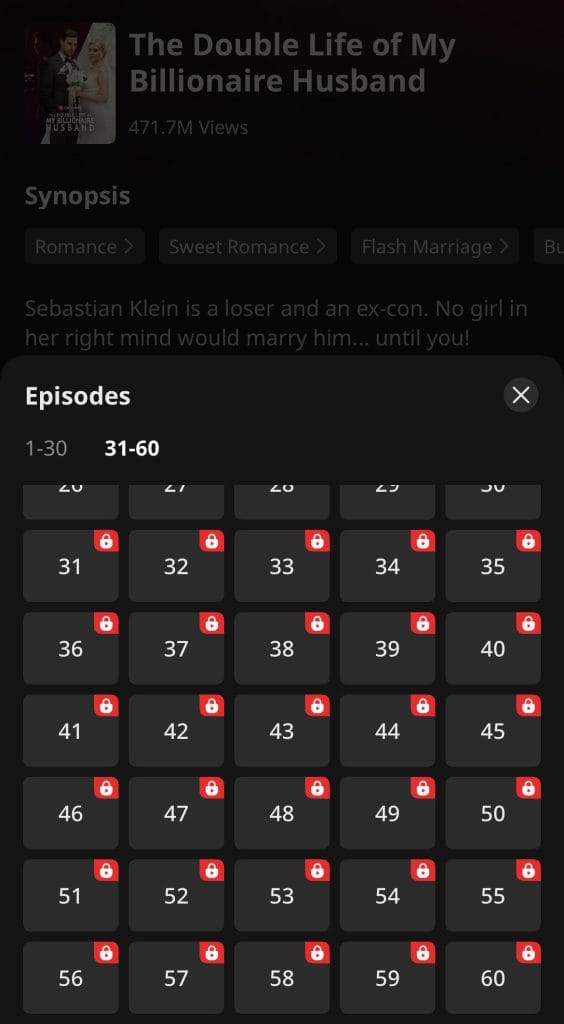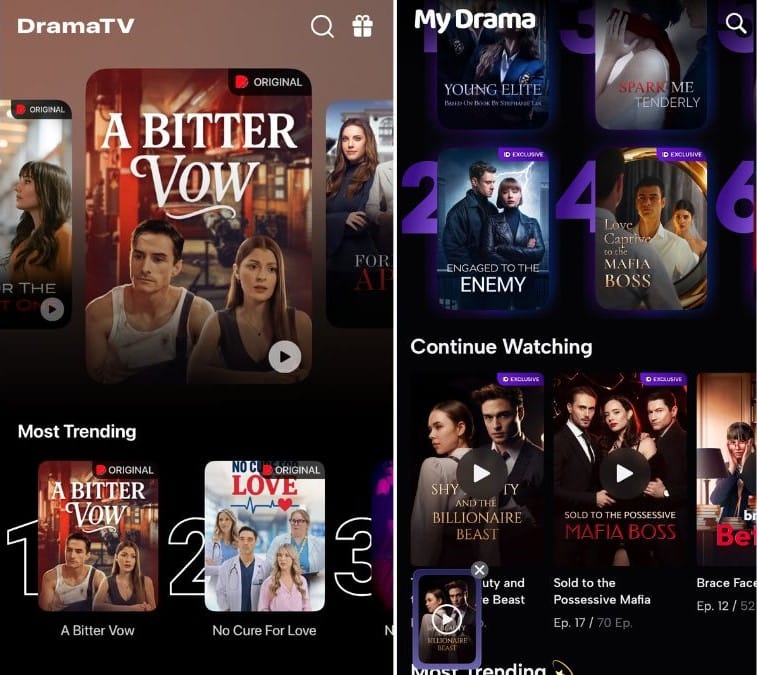It just took a five-minute cigarette break for Snigdha Das to get hooked to Chinese micro drama The Double Life of My Billionaire Husband. By the time she finished her second smoke, the protagonist had already discovered that her so-called loser husband is secretly a billionaire. That’s how fast things move in this format.
“I’ve got a one-and-a-half-hour metro ride home—I’ll wrap it up today and then dive straight into the next one. The micro drama content just keeps coming,” Das told ThePrint.
She finds it better than the suspense in Hindi soap operas. “In Laagi Tujhse Lagan, it took nearly 100 episodes just to reveal the girl’s real beauty. The buildup dragged on forever.”
Das is one of the many young viewers obsessed with the latest digital addiction: micro dramas. It’s the espresso shots of entertainment—bite-sized, vertical video series, 1-2 minutes per episode, made for your phone and packed with high-speed plots, wild twists, and addictive cliffhangers. The micro drama industry, which started as a Chinese obsession, has a global appeal today. It has gained popularity in the US. And, have started to enter the Indian market as well with platforms such as QuickTV.

The format follows a common recipe: romance, revenge, cliche characters and predictable storyline. It’s like a movie chopped up into 60-second videos — for a mobile-first audience which is already addicted to TikTok and Instagram.
With low production costs and innovative monetization strategies like in-app purchase and advertisements among other things, the sector is reshaping the entertainment landscape. In 2024, China’s micro drama market was reportedly worth 50.44 billion yuan ($6.9 billion). It reported a 34.9 per cent year-on-year growth. Over 3,000 micro dramas were produced or were set to release last year. This was in addition to the 700 projects available online.
Over 50 per cent of China’s 1.1 billion internet users, by June 2024, had engaged with verticals—content designed for mobile viewing—in some way or the other. Platforms like Reelshorts, Drama Box and Kuaishou—all Chinese—have millions of daily active users for micro dramas.
In 2023, Kuaishou boasted around 270 million daily active users tuning into micro dramas. Of those, more than 94 million were either paying viewers or bingeing over 10 episodes a day—a 52 per cent jump from the previous year. The platform now hosts over 100,000 micro drama channels on its own.
“In China, everyone is constantly on their phone. They want quick content. And micro-drams fit perfectly into their busy lifestyles,” said filmmaker Peiqi Peng who has made micro dramas such as My Boss thinks I’m a boy, My Serial Killer Lover, Straight A Pregnancy, and My Ex-Wife Is A Superwoman among others.
Each micro drama typically consists of around 70-80 episodes, with each episode lasting around 60 seconds. “They’re designed to be easily consumed—whether during smoke breaks, while commuting, or even lounging at home.”
Also read: Children are Old Delhi’s newest tour guides. Tourists can’t get enough of them
Filmmaking on steroids
Actor Griffin Blazi still remembers the flood of fan love after his show Claimed by the Alpha I Hate—a tale of a Alpha wolf and a vampire tangled in forbidden romance—became a major hit.
“It’s our Twilight or Vampire Diaries,” said Das. But with micro dramas, it’s like those shows got a double shot of adrenaline.
Fantasy reigns supreme here—wolves, vampires, fated lovers, and supernatural drama dominate the space. And while romance is always at the core, the storylines branch into sub-genres like age gaps, enemies to lovers, contract relationships, damsel rescues, unspoken feelings, and heartbreak that hits just a little too late.

Micro dramas are laser-focused on Gen Alpha and late Gen Z—audiences who’ve traded the cinema for their smartphones. “Depth isn’t the goal here. It’s not about logic, it’s about feeling. It’s emotional, not intellectual,” said Peng.
According to the filmmaker, micro dramas are “steroid versions of traditional filmmaking.”
The shooting schedules are usually of a week or ten days at max and actors are paid on a ‘per-day’ basis.
Pre-production and post-production can take over two months. At this pace, the micro drama industry pumps out 30-40 projects each month.
Storylines are predictable and promise a ‘happy ending’ from the poster itself. Blazi’s characters — be it of a businessman, gangster or even a vampire and werewolf — have enjoyed happy endings with the lady love.
The actor agreed to the ‘predictability factor’, but according to him, people watch “probably because they follow actors” or “they like the chemistry between two specific actors.”
Peng also defended the industry norm of repetitiveness.
“Its like any industry. No one wants to take risks when they know that there are plots which guarantee success. Also, the industry is relatively new. So maybe as time passes, there will be variations and diversity in the content,” she said.
While Peng adheres to the demand of the script and expectations from the production, there is one nonnegotiable for her: “I avoid stories that are very abusive towards women characters.”
Majority of the scripts are in Chinese and undergo translation while shooting in LA or NYC. In the process, Peng agreed, sometimes the essence gets lost.
The micro drama phenomenon transcended China’s borders because of ReelShort, a platform developed by Joey Jia’s Crazy Maple Studio. ReelShort has ownership ties and close operational connections with China’s COL Group, which also publishes games, operates a web novel platform, and counts Tencent as an investor.
ReelShort has exploded in the US, attracting competitors like DramaBox and ShortTV — three top market players in terms of revenue, with other apps far behind.
By early 2024, ReelShort experienced a 992 per cent increase in downloads, reaching 37 million, and generating an average monthly revenue of $10 million.
In an interview with Time, ReelShort founder Joey Jia underlined the potential of micro dramas in China.
“What really caught my eye was a new wave of influencers creating bite-sized dramas with actual storylines, and audiences couldn’t get enough. At the same time, platforms like iQIYI—China’s equivalent of Netflix—were investing modest budgets into 10-minute story-driven content, a far cry from traditional multi-million-dollar productions,” he told Time.
Jia saw a sweet spot: a clear appetite for short content with a narrative arc, produced at a fraction of the usual cost.
He decided to tap into Chapters’—a visual novel story platform — existing IP library and bring this new storytelling format to the US market. He pitched the idea in Hollywood, proposing that Crazy Maple’s stories could be adapted into fast, low-cost content. But the response was lukewarm — traditional distributors weren’t ready to back such lean productions.
“The investment was too small for them to take seriously,” said Jia.
So, he took matters into his own hands and built ReelShort—a dedicated distribution platform tailored for these micro dramas, designed to move fast, stay affordable, and deliver the kind of engaging, emotional storytelling modern audiences crave.
Also read: Palace dramas are the new OTT soaps. Real royals are just embarrassed
Stepping stone for budding actors
Blazi, 33, was working construction jobs in New York City when a surprise modeling offer from Calvin Klein landed in his lap. But fate threw a curveball—a street fight kept him from making it to the shoot. Not long after, another shot came, this time at the CFDA Men’s Awards.
There, a casual chat about acting changed everything. Encouraged to take an acting class, Blazi soon found an agent and made the leap to Los Angeles. Commercials and short films followed—but it was the world of micro dramas that truly catapulted him into the spotlight.
With over 40 vertical dramas under his belt, Blazi became a popular face in both China and US — especially among female viewers. His shows, including Claimed By The Alpha I Hate and Accidentally Pregnant, Forever Spoiled, have racked up millions of views online, making him one of the most recognizable faces in the genre.

“It is not a space where you work forever, but it’s a medium to earn money, instead of flipping patties and cleaning hallways. You can continue to evolve as an actor, polish your skills, and keep yourself prepared when the big opportunities come your way,” said Blazi.
The actor entered the micro drama world at the tail end of 2023 with the project Billionaire and CEO Obsession. After the first project, a sea of offers came in but Blazi was a little shy toward the platform as he didn’t understand it well.
“But, once I said yes, I just couldn’t snap out of the orbit. Have been a part since. For me, it has become the new iteration of soap opera.”
And, fans like Snigdha Das are grateful that Blazi did make it to the verticals. Das came across an advertisement of a ReelShort application marketing the story of Claimed By The Alpha I Hate while scrolling Instagram reels. After two minutes, the story left on the cliffhanger urging her to download the application.
Initially, Das, who was unaware of the industry, was skeptical. She wondered if it’s a “scam” or “an illegal website that can crash her phone.” But her infatuation couldn’t hold her back. And she ended up creating her account on the platform. Now she spends more time on ReelShort than Instagram.
However, Das’ good friend, Kritika Sharma backs actor Ethan Kirschbaum, following his role in The Reborn Wife’s Redemption..
While the two friends can argue for hours on which of the two “hot shots” is better, they have a common ground, that is, their dislike for Chinese versions.
For the Indian audience, Chinese stars are not visually attractive, the American actors are. So even though the stories are same, visually the dramas shot with American actors get more popular and get more views.
It isn’t surprising because on ReelShort alone, the majority Chinese content has views in thousands and lakhs, while the English dramas are battling it out in millions.
While Sharma has included watching micro dramas as a part of her bed-time routine, Das described herself as someone who lacks patience.
Therefore, unlike Sharma, it is difficult for her to wait for 24 hours in order to watch more episodes. She always ends up making in-app purchases.
Thus, people like Das are the primary target audiences of this booming industry.
Also read: Thudarum’s Prakash Varma went from Zoology to ads. Now, he’s Malayalam cinema’s breakout star
Revenue model and challenges
The Double Life of My Billionaire Husband has 466.7 million views on Reelshort. The most-watched Bollywood film on Netflix in 2024, RRR, had clocked in at 130.1 million views.

The micro drama industry’s revenue model is a mix of everything — from viewer payments, advertising, to brand collaborations. They adopt a freemium model, offering initial episodes for free or as bait and charging for subsequent ones. Users also have the option to purchase virtual currency to unlock episodes or earn access by watching advertisements, which are also paid.
Embedded advertising and product placements have become a key way for platforms to earn money. KFC launched a micro drama series featuring an ancient empress discovering KFC in modern-day China, effectively promoting its weekend deals.
Brands are also bankrolling their own micro dramas to market products.
Chinese skincare brand Kans created a series, Grow Up, integrating its products. The series tells the story of a female protagonist who joins the Kans Group and quickly gains recognition within the company for her competence and soft skills. The drama explores her career development, as well as a romance with the company’s CEO, according to Jing Daily.
Despite its success, the micro drama industry faces challenges, particularly regarding content regulation.
“Concerns over explicit content and societal impact have prompted Chinese authorities to tighten controls,” said Peng.
The rapid production cycle and low costs have also become its weakness. It has led to issues with copyright infringement.
“Unauthorized reproductions and remakes are common, highlighting the need for stricter intellectual property protections,” peng added.
The Chinese domestic market for micro dramas is nearing saturation, with most apps reportedly spending up to 80 per cent of their revenue on user acquisition.
At last year’s ChinaJoy gaming conference, marketing agency Yujin Culture estimated that more than 90 per cent of domestic micro drama platforms are currently operating at a loss.
Even ReelShort’s parent company, Crazy Maple Studio, despite its impressive growth, recorded only $33,000 in profit in 2023.
But followers like Das and Sharma have a different concern—the potential ‘Indianisation’ of the trend. An employee-CEO affair or a fantasy story when Indianised may turn out to be cringe, they believe.
While the content may be created by young writers for a young audience, fans and followers of micro dramas point out that those funding these projects would never be okay with the storylines because of the sexual content. They also worry that overly ‘woke’ audiences might begin scrutinizing the content too intensely, leading to censorship and stripping away the light, addictive quality that makes these platforms so engaging.
“People here still watch Anupamaa and Yeh Rishta Kya Kehlata Hai,” Das said. “Will they ever be able to move past their obsession with parampara, pratishtha, anushasan?”
(Edited by Anurag Chaubey)






